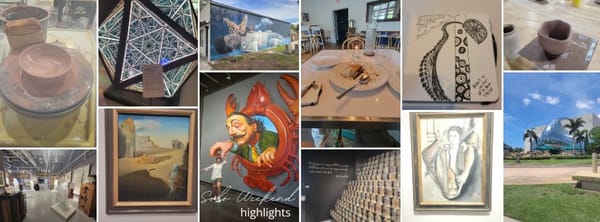Overzesting the Lemon: Fresh Perspectives in Operations Excellence

A lemon, a microplane, and a moment of insight. Who knew these could hold the key to operations excellence? Small changes—whether in the kitchen or in an organization—can lead to big results. In my kitchen, where meal prep often doubles as bonding time with my tween child, this small moment unfolded.
Recently, as we planned for the week ahead, I handed him a lemon and a microplane and asked him to zest it. I explained the basics: use gentle pressure, avoid overzesting, and watch out for the bitter white pith beneath the peel. He eagerly took on the task, grating a few strokes before carefully turning the lemon to inspect his progress. Then he stopped, flipped the microplane, and began zesting with the blade facing up so he could see exactly how much peel he was removing.
“This way,” he said, “I can tell if I’m getting too close to the pith and I can see how much zest I'm collecting.”
I paused, realizing he had just improved on the process I’d taught him. A small adjustment, born of curiosity and observation, had made the task more efficient and accurate. It struck me: The biggest mistake leaders make? Assuming expertise is the only path to solutions. Over-reliance on expertise can sometimes blind us to fresh, transformative ideas. The best insights often come from those willing to see things differently.
Fresh Perspectives in Operations Excellence
In operations, as in zesting lemons, a small adjustment can reduce waste, improve efficiency, and lead to better results. Processes can be refined and optimized endlessly, but, like flipping the microplane, small, unexpected changes can uncover surprising efficiencies. For example, while reviewing how frontline staff documented patient interactions in the EMR, we noticed that the system design required users to switch between workspaces. Based on this observation, we streamlined the process to allow quick note entry in a single interface, saving staff time and reducing errors.
The same principle applied in my kitchen. My child wasn’t a subject matter expert (SME) on zesting, but his outsider perspective allowed him to spot inefficiencies and propose a simple, effective solution. By flipping the microplane, he made the zest visible, creating transparency and reducing the risk of overzesting. This mirrors a critical truth in leadership: fresh perspectives can reveal blind spots that expertise might miss.
Take the concept of flipping the microplane. It’s a small, almost obvious change, but its impact is significant. By making the zest visible, the process became transparent, reducing the risk of overzesting and ensuring consistency. The same principle applies in operations: transparency and real-time feedback are essential for success.
Why Outsiders See What SMEs Miss
Subject matter experts have deep knowledge and experience, which are invaluable for solving complex problems. But expertise comes with a potential downside: familiarity. When you’re too close to a process, inefficiencies can become invisible. Observers, on the other hand, bring curiosity and fresh eyes. They question assumptions and often see opportunities that SMEs might overlook.
Here’s why this matters:
- Curiosity Drives Innovation: Outsiders ask questions like, “Why do we do it this way?” Their lack of familiarity isn’t a weakness; it’s an asset. For instance, a field team member once pointed out how challenging it was to enter field notes into our CRM while on the road. This feedback led us to develop a solution where notes could be captured via Excel and bulk uploaded weekly, saving each team member at least an hour a day on data entry.
- Simplification Emerges: Because they aren’t entrenched in the process, observers focus on simplicity, making tasks more efficient.
- Perspective Challenges Norms: Outsiders don’t carry the baggage of “we’ve always done it this way,” which often limits innovation.
How Leaders Can Leverage Fresh Perspectives
Leaders often seek to optimize processes but may overlook the value of inviting fresh perspectives. Here’s how to apply this principle in your organization:
1. Invite Fresh Eyes
Encourage new team members, stakeholders, or even external consultants to observe key processes. Frame these invitations as opportunities for fresh eyes to uncover hidden inefficiencies and emphasize how their insights could make a meaningful impact, ensuring participants feel valued and engaged. A fresh perspective can identify inefficiencies or opportunities for improvement that seasoned professionals might miss.
2. Encourage Curiosity
Create a culture where questioning norms is welcomed. Foster an environment where team members feel empowered to suggest alternative approaches, even if they lack direct expertise.
3. Measure What Matters
Real-time feedback is critical. Just as flipping the microplane made the zest visible, operational transparency helps teams monitor progress and adjust before mistakes snowball.
4. Simplify Where Possible
Complexity often hides inefficiencies. Encourage teams to break down processes into simpler, manageable steps to improve outcomes.
The Art of Not Overzesting
Zesting isn’t just a kitchen task; it’s a metaphor for leadership. Overzesting—adding too much, going too far, or complicating the process—can ruin the final result. For instance, while analyzing how lab technicians logged inventory, we discovered they were navigating through multiple unnecessary screens in the system. By streamlining the interface to show essential fields upfront, we reduced data entry time by 30% and improved accuracy. In contrast, thoughtful adjustments and intentional processes ensure balance and efficiency.
Sometimes, the best insights come from unexpected places: a child with a lemon, a new hire with fresh eyes, or a team member willing to ask, “What if we did it differently?”
So the next time you face a challenge, ask yourself: Who in your organization might have the next game-changing insight? And are you willing to let them flip the microplane? This week, invite someone to challenge a norm—you might be surprised by the results.
